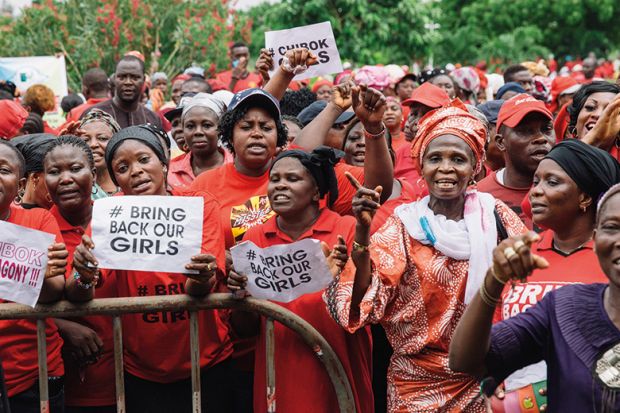Alexander Thurston has written a clear, richly sourced, matter-of-fact history of Boko Haram, West Africa’s most notorious terrorist organisation. The book’s strength is in its careful attention to the interplay between political events, personal networks and Boko Haram’s strategy and behaviour. The reader is guided, in grim detail, through the battles, declarations, terrorist operations and scorched-earth government reprisals that make up Northern Nigeria’s chief contemporary nightmare.
This book offers several micro-histories of Boko Haram and its context – a welcome rarity in the reams of jihadist studies that are preoccupied with establishing familial links and too-linear cause and effect relationships between religious doctrine and terrorism. One of the most useful is in its focus on the local context of the city of Maiduguri. Here Thurston unravels with marvellous skill the patronage networks, dynamics of political competition and unaccountable politicians that fermented some of the bitter seed that would later become Boko Haram. His detailed biography of Mohammad Yusuf, Boko Haram’s founder, is well conceived, and helps us comprehend not only the why but the “how” of his popularity in Maiduguri through an understanding of who he sought to influence (mainly the poor, but also, importantly, the very corrupt politicians who in large part perpetuated that poverty). These details of how Boko Haram drew from a wide socio-economic spectrum, while making an explicit pitch to the poor, all against the backdrop of Yusuf’s personal charisma, helps demystify the movement in a crucial way.
The book’s theoretical hypothesis – “Boko Haram represents the outcome of dynamic locally grounded interactions between religion and politics” – is one that anyone would be hard pressed to argue with, and as such it is not particularly generative. While the “politics” section of this formulation is very well conceived, the “religion” part is rather more wooden. One gets the sense that “Islam” is surely a much more weighty signifier for the members of Boko Haram than this book describes. An example of this two-dimensional treatment of religion is Thurston’s discussion of colonialism. While he does an impressive job of illustrating the micro-effects of colonialism in the city of Maiduguri, especially with respect to economics and labour, the effects in the region more generally are minimised and there is little to no discussion of the impact of colonialism on Islamic law and Islamic authority, which is surely a trauma worth exploring in more detail.
The book in general takes a top-down approach to describing Boko Haram and, for example, documents various scepticisms among salafi elites about the political and religious efficacy of the post-1999 sharia experiment. At bottom, though, Boko Haram’s revolution for sharia is a grass-roots phenomenon, and one longs for more representation of that voice. All projects have their boundaries, and this one seems to stop at the perspective of the rank and file. Despite this, Thurston’s book provides an excellent micropolitics of the career of Boko Haram which will satisfy the reader with a craving for the details of the events and networks that make a movement.
Sarah Eltantawi is professor of comparative religion and Islamic studies at the Evergreen State College and the author of Shari’ah on Trial: Northern Nigeria’s Islamic Revolution (2017).
Boko Haram: The History of an African Jihadist Movement
By Alexander Thurston
Princeton University Press 352pp, £24.95
ISBN 9780691172248
Published 6 December 2017
Register to continue
Why register?
- Registration is free and only takes a moment
- Once registered, you can read 3 articles a month
- Sign up for our newsletter
Subscribe
Or subscribe for unlimited access to:
- Unlimited access to news, views, insights & reviews
- Digital editions
- Digital access to THE’s university and college rankings analysis
Already registered or a current subscriber?





